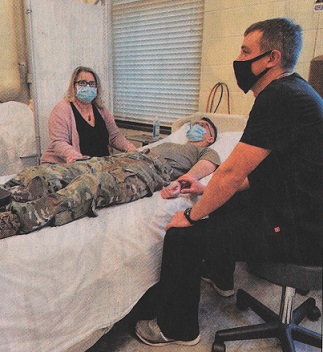As a means of alleviating nursing home staffing shortages, Ridgewater College announced this week that it will be offering nursing assistant classes—at no cost—to participating students.
These classes will be offered on both the Willmar and Hutchinson campuses starting Jan. 3 with the 32 students already enrolled, scheduled to complete their courses by Jan. 31.
Once trained, the Certified Nursing Assistants (CNAs) will become eligible for employment at Minnesota long-term care facilities that are facing severe staffing shortages.
Funding is provided by the state’s federal American Rescue Plan (ARP) monies, which will cover all expenses including tuition, fees and course materials.
Ridgewater developed the program in response to the Walz-Flanigan Administration’s Dec. 6 announcement of a new initiative to recruit, train and deploy at least 1,000 new CNAs by the end of January through a partnership between state government, colleges and long-term care providers.
“Thousands of Minnesota families rely on our long-term care facilities to provide specialized medicare care to their loved ones,” said Lieutenant Governor Peggy Flanagan in a Dec. 6 statement. “We’re taking action now to build a future workforce of talented new nursing assistants to make sure these patients and residents receive the quality care they deserve.”
In order to meet this goal, added Dennis Olson, Minnesota Office of Higher Education Commissioner, “we are eliminating many of the financial barriers that prevent students from earning their CNA credential.” Statewide, $3.5 million of Minnesota’s ARP funds will be allocated to these programs.
Sam Bowen, Ridgewater College’s Dean of Customized and Continuing Education, said Ridgewater is “proud to answer the Governor’s call to train [CNAs] during the pandemic.”
“Our instructors and staff have been outstanding at adapting to the ever-changing situation,” Bowen said in a statement Monday.
Training is offered in a hybrid format, meaning the 75-hour program will be split between online and hands-on components and modeled after similar training provided to the Minnesota National Guard.
Shortly after Thanksgiving this year, Ridgewater trained seven members of the Minnesota National Guard for deployment as emergency, temporary nursing assistants. Statewide, the Governor’s Office has been training, since Dec. 6, roughly 400 National Guard members at 16 colleges within the state system for deployment as emergency temporary nursing assistants in facilities facing severe shortages.
In an interview with the Review Tuesday, Bowen said the previous National Guard training “went well,” but noted that the program was “very intensive,” packing all 75 hours of courses into a nine-day session. Students, however, will be given one month.
Bowen adds that student interest in the program has been overwhelming.
“Classes filled up very quickly after announcing we’d be participating,” he said, “so the response has been tremendous. So we think that it can go a long way toward deploying temporary nursing assistants.”
The program is a non-credit certificate course, which students would typically pay a fee to the college to participate in. Once complete, they are able to take their CNA registry exam. Although these students may choose to work at long-term care facilities on a temporary basis, “the idea is that these folks will turn around and become employed at these facilities,” Bowen said.
Monday’s announcement by Ridgewater coincides with the Minnesota Department of Health’s own; figuring in holiday weekend numbers, MDH reported the state has now surpassed one million COVID-19 cases since the onset of the pandemic.
In addition, the CDC, on Thursday, Dec. 23, released an update on its guidance for “contingency and crisis management in the setting of significant healthcare worker shortages. Bracing for a potential Omicron variant surge, these updates provide healthcare facilities “with the strategies to limit the effects of staff shortages caused by COVID-19 on patient care,” and allow for healthcare workers with COVID-19 who are asymptomatic to return to work after seven days with a negative test. However, “This isolation time can be cut further if there are staffing shortages,” according to the CDC.
Further, healthcare workers who have received all recommended COVID-19 vaccine doses, including a booster, do not need to quarantine at home following high-risk exposures, according to the update.
However, these guidelines apply only to the healthcare workforce and may be revised as additional information on the Omicron variant becomes available.
In the meantime, CDC Director Dr. Rochelle Walensky advises healthcare personnel to vaccinate.
“As the healthcare community prepares for an anticipated surge in patients due to Omicron, CDC is updating our recommendations to reflect what we know about infection and exposure in the context of vaccination and booster doses,” she said. “Our goal is to keep healthcare personnel and patients safe, and to address and prevent undue burden on our healthcare facilities. Our priority remains prevention—and I strongly encourage all healthcare personnel to get vaccinated and boosted.”
The MDH’s most recent figures released Monday, indicate 55% of Kandiyohi County residents have received at least one vaccine dose. The statewide average for completion of a full vaccination series stands at 65.2%.
Lakes Area Review by Brett Blocker, Editor

